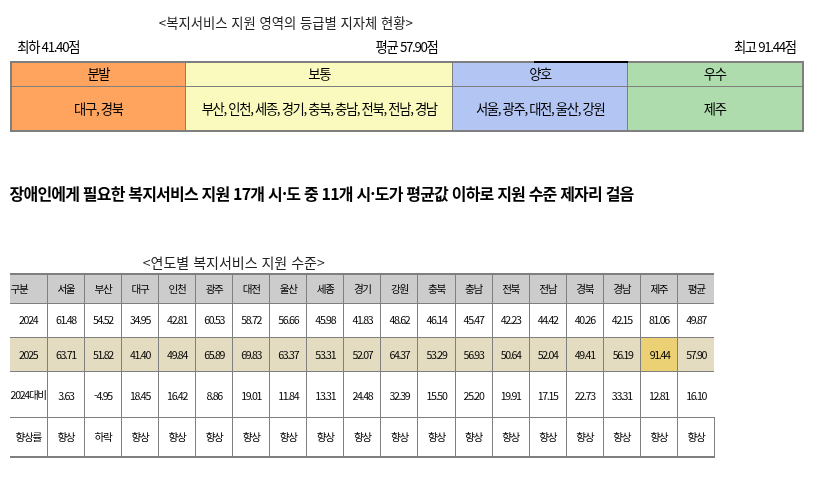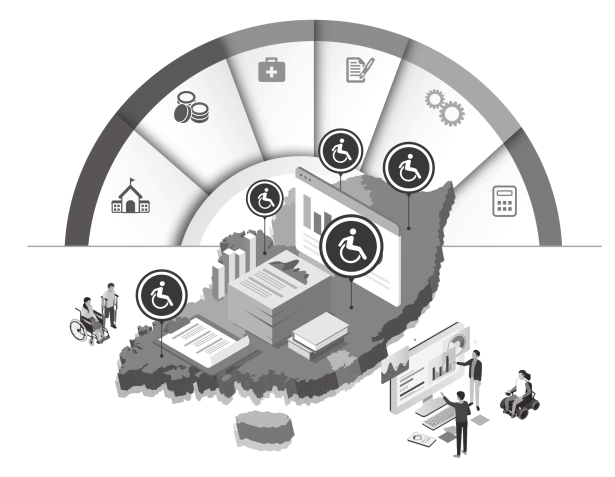전라북도는 2025년 장애인 복지서비스 지원 영역 평가에서 56.93점을 기록해 전국 평균인 57.90점에 약간 미치지 못한 것으로 나타났다. 다만 지난해보다 15%가량 상승한 수치로, 장애인 복지 인프라 전반에서 꾸준한 개선이 이루어지고 있다는 점은 긍정적으로 평가된다. 전북은 지난해 ‘분발’ 등급에서 한 단계 상승한 ‘보통’ 등급을 받았지만, 2년 연속 전국 평균 아래에 머물렀다는 점에서는 여전히 보완 과제가 남아 있다.
한국장애인단체총연맹(한국장총)이 발표한 「2025년 전국 시·도별 장애인 복지·교육 비교 연구」에 따르면 전북은 장애인복지관 운영, 직업재활시설 확충, 전문 인력 확보, 이용기관 서비스 등 주요 평가 항목 대부분에서 전년 대비 향상된 점수를 받았다. 특히 직업재활 기반 확충과 서비스 접근성 개선, 현장 종사자 인력 보강 등은 전북의 장애인 복지서비스 역량이 이전보다 안정적으로 성장하고 있음을 보여준다.
전국적으로는 17개 시·도 중 11개 지역이 평균 점수에 미달해 지역 간 복지 수준의 격차가 여전히 큰 것으로 나타났다. 전북은 이러한 흐름 속에서 중위권을 유지하고 있지만, 상위권인 제주·서울·광주 등과 비교하면 여전히 격차가 존재한다. 전문가는 전북이 한 단계 더 도약하기 위해서는 지속적인 인프라 확충과 장애 특성에 맞춘 맞춤형 서비스 개발, 전문 인력의 안정적 확보가 필수적이라고 지적한다.
전북의 장애인 복지서비스가 양적 성장과 함께 질적 변화를 이루기 위해서는 지역 간 접근성 불균형, 고령 장애인 증가, 중증 장애인의 돌봄 수요 확대 등 지역 특성에 맞는 정책 조정이 필요하다는 데 의견이 모인다. 전북도 관계자는 현장 중심의 복지체계를 강화하고 장애인의 일상에 실질적인 변화를 가져올 수 있는 정책을 계속 발굴해 나가겠다는 입장을 밝혔다.
이번 평가 결과는 전북의 장애인 복지서비스가 개선의 흐름을 이어가는 가운데, 앞으로 해결해야 할 과제 또한 분명히 존재함을 보여준다. 한국장애인단체총연맹의 공식 보고서를 토대로 한 이번 지표는 향후 전북의 장애인 복지정책 방향을 설정하는 중요한 자료로 활용될 전망이다.

Jeollabuk-do scored 56.93 points in the evaluation of disability welfare service support areas for 2025, slightly below the national average of 57.90 points. However, this marks a 15% increase from the previous year, indicating steady improvements in disability welfare infrastructure overall, which is positively evaluated. While Jeollabuk-do moved up from the 'effort' grade to the 'average' grade last year, it still remains below the national average for the second consecutive year, highlighting the need for further improvements.
According to the "2025 National Comparison Study of Disability Welfare and Education by City and Province" released by the Korea Disabled People's Federation (Korea Jangchon), Jeollabuk-do received improved scores in most key evaluation criteria compared to the previous year, including the operation of disability welfare facilities, expansion of vocational rehabilitation facilities, securing of specialized personnel, and service accessibility for user organizations. Particularly, the expansion of vocational rehabilitation bases, improvement of service accessibility, and reinforcement of on-site staff indicate that Jeollabuk-do's disability welfare service capabilities are growing steadily and more stably than before.
Nationally, it was revealed that 11 out of 17 cities and provinces fell below the average score, showing significant disparities in welfare levels among regions. While Jeollabuk-do maintains a mid-range position within this trend, there still exists a gap when compared to top-ranking regions such as Jeju, Seoul, and Gwangju. Experts point out that for Jeollabuk-do to take a further leap, continuous infrastructure expansion, development of tailored services tailored to the characteristics of disabilities, and stable securing of specialized personnel are essential.
To achieve qualitative changes alongside quantitative growth in Jeollabuk-do's disability welfare services, there is a consensus on the need for policy adjustments tailored to regional characteristics, such as addressing uneven regional accessibility, the increasing population of elderly people with disabilities, and the growing demand for care for severely disabled individuals. Officials in Jeollabuk-do have expressed their commitment to strengthening a welfare system centered on the field and continuously discovering policies that can bring substantial changes to the daily lives of people with disabilities.
The evaluation results show that while Jeollabuk-do's disability welfare services are continuing on a path of improvement, there are clearly defined challenges that need to be addressed in the future. Based on the official report from the Korea Disabled People's Federation, this indicator is expected to serve as an important reference for setting the direction of Jeollabuk-do's disability welfare policies in the future.


